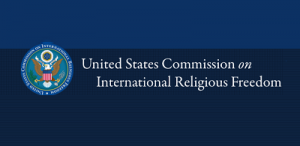On the Hill: U.S. Commission Releases Annual Report on the State of Religious Freedom

Last week I attended an event on the release of the U.S. Commission on International Religious Freedom’s (USCIRF) annual report, entitled “15th Anniversary Retrospective: Renewing the Commitment,” which “examines the past decade and a half of U.S. foreign policy as it relates to religious freedom promotion and provides recommendations for how the United States can more effectively advance this right in the 21st century.” USCIRF is an “independent government advisory body that monitors religious freedom worldwide and makes policy recommendations to the President, the Secretary of State, and the Congress.”
The event’s speakers educated the audience about some of the biggest religious freedom concerns, including the rise of Buddhist nationalism and the accompanying attacks on Muslim communities by Buddhist communities, the rise of both religious revolutionaries and secular autocrats, and the fact that 75% of the global population live in a country where the government oppresses religious minorities or allow other groups to do so. The speakers also made the case that nations that trample on religious freedom provide fertile ground for war and poverty and terrorism, which is why in their view religious freedom is not only a moral imperative but a global security necessity.
I was disheartened to find that the event focused almost entirely on religious freedom concerns for religious minorities, and that the struggles that atheists, humanists, agnostics, and other nontheists face on a daily basis were hardly mentioned at all. There are certainly plenty of cases of atheists around the world being oppressed for their lack of belief, such as in Nigeria where a man was recently committed to a mental institution by his family because of his atheism, or the numerous atheists bloggers that have been arrested in Bangladesh and other countries for being open about their disbelief, or the atheists that have been arrested in Egypt for “blasphemy.”
While USCIRF is doing a great job at monitoring cases of deprivation of religious liberty for religious minorities around the world, I hope it will increase its advocacy for the rights of nontheists. Religious liberty is not merely the right of religious people to practice their faith as they see fit—it is also the right of individuals to choose not to believe in a god or a religion free from oppression by either their government or their fellow citizens.
